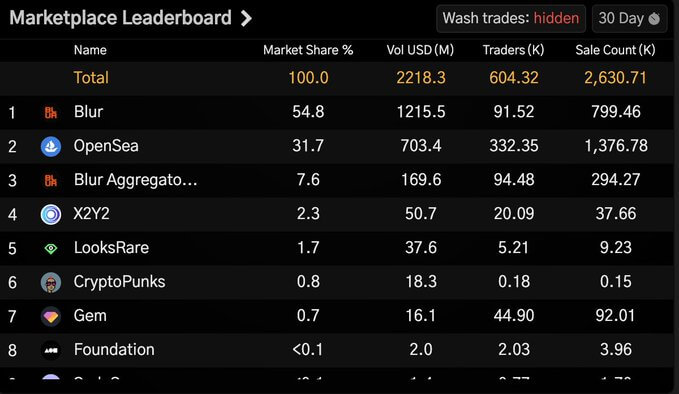Aaron Sage said, “Blur is the worst thing to happen in this space,” in a recent tweet.
The writer, who described himself as “deeply passionate about NFTs, Crypto, and Self-Development,” then blasted the marketplace on the basis that non-fungibles are “not all about money.”
“They have brainwashed you with their incentives and given you free money to hook you in.“
He continued by criticizing BLUR’s UI as uninspiring, pointing out that it resembles a list that is devoid of “art, project description, or anything.”
Furthermore, Sage thought it fitting to mention that the marketplace has not supported creators with grassroots initiatives, unlike rival platform OpenSea.
Ending his tweet thread, Sage said he doesn’t hate BLUR or its users, only that he longs for how the NFT space used to be when it was centered around “art and culture,” not money.
“I just wish the NFT space could switch it’s lens to how we used to be – about the art and culture (i.e. ape noises in clubhouse and even the lazy lion twitter raids), but not what it is today with Blur.“
Blur knocks OpenSea off the top spot
BLUR launched in October 2022 with backing from Paradigm and ParaFi, managing to raise $11 million in seed funding seven months prior.
By February, research platform Delphi Digital said BLUR had achieved a 53% market share just months after launching. This is attributed to several factors, including zero marketplace fees, an option to skip or reduce royalty payments, and fast NFT sweep/swipes (the function to buy multiple NFTs at once.)
In addition, Delphi Digital said that BLUR’s generous token airdrop scheme was a significant factor in its surging market share.
On Feb. 14, eligible users received their share of 360 million tokens, equating to 12% of the supply, netting an average of $2,943 each, per Forbes. The firm recently announced a “Season 2” airdrop with an additional 300 million to be distributed.
More up-to-date figures from @osf_rekt show BLUR has extended its market share to 55%, approaching twice that of the next nearest marketplace, OpenSea.

OpenSea is not for traders
Regarding which marketplace is better, @GSKrovina said the main difference between BLUR and OpenSea is that the former is geared toward traders, not retail users – as evidenced by its list format and sweep/swipe feature.
Although Sage criticized BLUR’s UI, @GSKrovina said it better suited traders looking to “move volume.” Further, with no native OpenSea token, users are incentivized to stick with BLUR, at least in the short term.
“Blur UX/UI is simply better than OS, especially for traders who move volume.“
Similarly, @seelawrie said BLUR “seem[s] to understand the culture better than @opensea,” thus contradicting Sage’s point on NFTs not being all about money.
The post Aaron Sage deems BLUR ‘the worst thing to happen’ in NFT space; others disagree appeared first on CryptoSlate.







